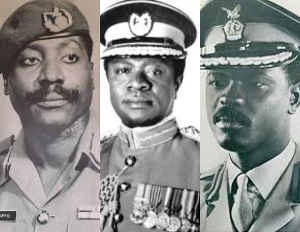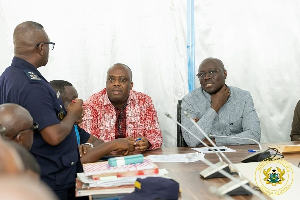(By Francis Ameyibor, Development Communicator)
Accra, Feb. 28 – The Electoral Commission Chairman, Dr Kwadwo Afari-Gyan, is a man you will hate or love depending on where you stand at the end of elections.
And, as the saying goes: "love or hate me, am ordained to manage elections".
As an Electoral Reporter I have had very close working relationship with Dr Afari-Gyan since 1999 up to date. I can confidently say that Dr Afari-Gyan (born 18 June 1945) represents Ghana's Electoral Commission and the Electoral Commission is the epitome of Dr Afari-Gyan. Indeed, "he is a walking electoral encyclopaedia".
Anybody who is nominated as the next EC Chairman in my estimation may need at least six months tutelage from Dr Afari-Gyan to enable him/her to take over. I am not by this underrating the capacity of any other commission member or whoever may be appointed.
The man is two personalities in one body – calm, affable, jovial, deep thinker, open minded, firm, tolerant but at the same time can be described as hot tempered, intolerable, disciplinary, fearless and uncompromising.
Ghana needs him to manage a smooth transition to the next EC Chairman. This transition period should not be less than six months or Election 2016 may encounter operational hiccups.
He has been in charge of EC since 1993, after having served as the Deputy Chairman in charge of operations of the Interim National Electoral Commission (INEC) in 1992.
Dr Afari-Gyan is therefore the first substantive EC chairman. He has successfully been involved in or chaired and supervised all elections so far - 1992, 1996, 2000, 2004, 2008 and 2012.
President John Dramani Mahama was spot on when he described Dr Afri-Gyan as an "illustrious son."
Delivering his State of the Nation Address in Parliament, President Mahama acknowledged the critical role Dr Afari-Gyan has played over the past 23 years in shaping Ghana's democracy.
"Let me, on behalf of the people of Ghana, express our respect for the dedication to work shown by Dr. Afari-Gyan - an illustrious son of Ghana; the nation will miss you for the dedicated meritorious service," President Mahama noted.
Political Scientist Dr Kwesi Jonah has also described Dr. Afari-Gyan as distinguished personality and one of Africa's most respected electoral commissioners.
"Ghana will miss him when he retires in June. Believe me or not when Dr. Afari-Gyan retires in June, I am sure a lot of Ghanaians will miss him. He has maintained the EC. The Ghana EC has a very good reputation on the African continent and the whole world for so many years," Dr. Jonah stated.
According to Electoral Experts, Dr Afari-Gyan's term has seen great changes in the conduct of elections in the country.
In 1992, opaque ballot boxes were used by the EC for the conduct of both the presidential and parliamentary elections which was largely criticized by the opposition parties leading to the boycott of the parliamentary election.
One of the significant reforms that took place after the 1992 general elections was the replacement of opaque ballot boxes with transparent ballot boxes.
Again during the 1992 general elections the choice of candidates on the ballot papers were made in classrooms leading to allegations and counter allegations by political parties, observers and the electorate.
It was alleged that some voters had ballot papers in their pockets which they equally thump printed and slotted into the ballot boxes.
After various deliberations the EC agreed with the political parties that instead of thump printing of the choice of candidate by the voter be held in the open behind temporal polling booths instead of classrooms.
In order to build further trust and confidence in the electoral process and to avoid conflict the EC in conjunction with stakeholders agreed that candidate contesting an election should have an agent at the polling center.
Other reforms under Dr Afari-Gyan are replacement of plain voter ID cards with photo ID cards, photos on Voters' register, access to the strong room etc.
Before 2000, party agents were not allowed to get closer to the electoral officials during voting; they were supposed to observe proceedings at a distance.
However, the reforms permit agents to operate from a reasonable distance to have a fairly good knowledge of the voting process.
After the decision to have party or candidate agents at polling centers, political parties and the EC realized the need to train party agents because of the negative reports emanating from the field after the 2000 general elections.
The EC decided therefore that party agents should be trained by the Commission for uniformity and to create a level playing field for all.
Apart from the presence of party agents at polling centers, the EC under the management of Dr Afari-Gyan allowed party representatives at collation centers for the verification of the collated results.
Again under the administration of Dr Afari-Gyan the EC transformed the system of balloting for position on the ballot paper. From 1992 to 1996, political parties queued for positions on the ballot paper meant for the conduct of the polls.
This system was considered as stressful and therefore the EC decided to ballot.
In 1992, recounting of ballots was only done at the constituency level; however, now election results can now be recounted at the polling centers if there is a challenge.
A candidate or his counting agent may, if present when the counting of the votes is completed require the presiding officer to have the votes counted or again recounted, but the presiding officer may refuse to perform the second count if in his opinion the request is unreasonable and refer such request to the returning officer who shall recount the ballot for that polling station only at the constituency center.
The assistance of the physically challenged to vote; the use of brail by the blind and the opportunity to assist in voting are all reforms which can be credited to Dr Afari-Gyan's leadership.
Dr Afari-Gyan again introduced the concept of allowing party agents at printing houses where ballot papers were being printed. This concept was aimed at building trust and confidence in the electoral process.
The distribution of vehicles to political parties in 1996 emanated from a proposal made by registered political parties on the need for the state to fund political parties also aimed at creating a level playing field.
The introduction of optical mark readers by the EC was to enhance the integrity of the electoral system and create transparency as a result of complaints and problems of human error in the old data entry system by stakeholders.
The scanning of voter data or information is vital in ensuring accuracy in the process of transferring voter details onto the register. The system has since 1995 improved significantly.
The introduction of seals on ballot boxes has received incremental changes over the years. Political parties were initially given the opportunity to write the unique numbers of security seals affixed to ballot boxes during voting process.
This mechanism was adopted to build trust and confidence in the electoral system and to eliminate suspicion of the introduction of foreign materials particularly ballot papers before, during and after voting.
However, some political parties still doubted the authenticity of the EC ballot and therefore were given the opportunity to affix their own seals if they so wished.
The signing of declaration of results sheets at polling centers by political parties. The counting of ballots in the open was initiated by the EC with the view to enhancing transparency.
Other significant changes include development of a code of ethics for political parties to regulate inter-party relationships and the behaviour of the parties during elections.
Ghana also needs to salute for their valuable contributions to the development electoral systems and administration of the EC Mr David Adeenze-Kangah, Deputy Chairman in Charge of Finance and Administration; Mr Kwadwo Sarfo Kantanka, Deputy Chairman in Charge of Operations; Mr Kwame Damoah-Agyemang, Chief Director; Mr Albert Kofi Arhin, Director of Elections; Mr Kwamena Akarfi, Director of Research and Monitoring; Mr. Henry Okine, Director of Public Affairs; Mr Hubert Akomea, Director of ICT.
Opinions of Monday, 2 March 2015
Columnist: Ameyibor, Francis














